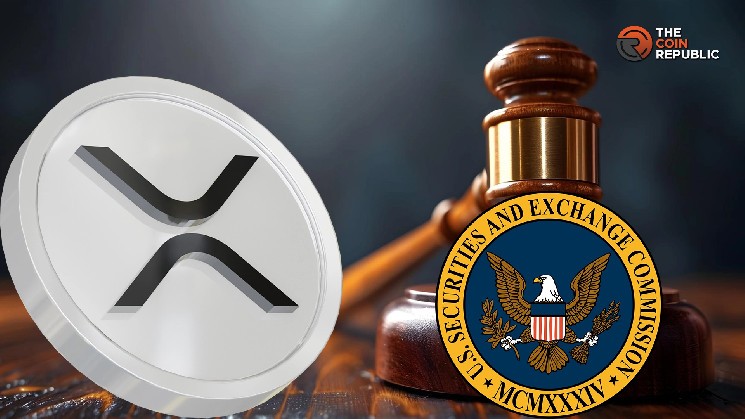Ripple Fights Back On XRP Sales Ruling Amid SEC Appeal Drama

Ripple Labs has filed a Form C cross-appeal in the U.S. Court of Appeals for the Second Circuit as part of its ongoing legal battle with the U.S. Securities and Exchange Commission (SEC). The company seeks to reverse certain parts of a prior ruling concerning specific XRP token institutional sales, which were considered securities, and hence subject to a fine of $125 million by the court.
Ripple’s Chief Legal Officer, Stuart Alderoty, said the appeal does not challenge XRP’s status as a non-security, as declared in the aforementioned pivotal court ruling in July. The said cross-appeal challenges the district court’s interpretation of the 1933 Securities Act regarding XRP sales.
The argument revolves around the meaning of the term ‘investment contract,’ in that it usually involves the death of post-contractual obligations of the seller or a buyer’s entitlement to profits created from the seller’s efforts.
The firm argues that it sells XRP neither at the request nor for the account of any buyers. That neither of these conditions applied to its XRP sales, and the court’s decision was too broad in reading securities.
Ripple also counters the court’s use of the Howey Test (1946 Courts standard to classify a transaction as a security). According to the company, the court doesn’t get the “investment of money” or “common enterprise” part of the Howey framework right.
Furthermore, XRP works in a decentralized environment where the investor returns are not entirely based on activities, making XRP ineligible from the securities classification used by the court.
Ripple’s Fair Notice Defense Challenges SEC Authority
Ripple has also criticized the SEC’s approach, especially noting the requirement for clear regulatory guidance for companies. The firm also claims it could only have deliberately flouted the rules when adequately instructed.
If Ripple’s fair notice defense is upheld, it would facilitate the continuation of the problematic precedent of regulatory ambiguity for the cryptocurrency industry, leading to enforcement against it solely on fair notice.
Pro-XRP attorney Jeremy Hogan said Ripple’s fair notice argument could substantially reduce the SEC’s enforcement power if successful. If the case results in a favorable outcome for the firm, the fact that regulators may provide clearer guidance for cryptocurrency firms could also help set transformative enforcement laws moving forward.
This position clarifies that Ripple believes regulatory agencies must disclose their guidance and make it easy to comply. Ripple also opposes the court’s injunction, which told the firm to act according to the law in a way that Ripple calls vague.
According to Ripple, the lack of specific guidelines makes compliance challenging, and the race to come under its drag nets legal risk and hinders operational clarity. The firm’s legal team believes that such a refined injunction would provide the firm and the industry with more precise standards.
SEC Appeals XRP Sales Ruling
At the same time, Ripple is facing an appeal from the SEC at the Second Circuit Court, which disputes the programmatic XRP sales and employee distributions made by Ripple itself. Judge Analisa Torres’ ruling that those sales did not constitute securities violations, the SEC wants it overturned.
The SEC alleges Ripple executives Brad Garlinghouse and Chris Larsen have facilitated unregistered XRP sales, which Ripple disputes. It’s all in the appeal: The SEC needs to extend its regulatory oversight over cryptocurrency transactions.
If the SEC’s lawsuit succeeds, it could precede other digital assets treated as securities and ripple effect on token sales across the industry going forward. Further, this case also presents questions about the SEC’s regulatory reach and whether it will stretch to all digital assets, an idea that has attracted heavy scrutiny.
XRP continues to see interest in its ongoing expansion into new markets as Ripple ha been discussing XRP-backed ETFs in recent days. It is noteworthy that asset managers like Bitwise and Canary Capital have continued to show interest.
Evidently, the continued widespread interest in XRP among industry players further reinforces its legitimacy and broad acceptance within the crypto economic space.





 Bitcoin
Bitcoin  Ethereum
Ethereum  Tether
Tether  Dogecoin
Dogecoin  USDC
USDC  Cardano
Cardano  TRON
TRON  Chainlink
Chainlink  Stellar
Stellar  Hedera
Hedera  Bitcoin Cash
Bitcoin Cash  LEO Token
LEO Token  Litecoin
Litecoin  Cronos
Cronos  Ethereum Classic
Ethereum Classic  Monero
Monero  Dai
Dai  Algorand
Algorand  OKB
OKB  Cosmos Hub
Cosmos Hub  Stacks
Stacks  Theta Network
Theta Network  Gate
Gate  Maker
Maker  KuCoin
KuCoin  Tezos
Tezos  IOTA
IOTA  NEO
NEO  Zcash
Zcash  Polygon
Polygon  Synthetix Network
Synthetix Network  Tether Gold
Tether Gold  TrueUSD
TrueUSD  Dash
Dash  Holo
Holo  Zilliqa
Zilliqa  Enjin Coin
Enjin Coin  0x Protocol
0x Protocol  Basic Attention
Basic Attention  Qtum
Qtum  Siacoin
Siacoin  Ravencoin
Ravencoin  Bitcoin Gold
Bitcoin Gold  Decred
Decred  NEM
NEM  DigiByte
DigiByte  Ontology
Ontology  Nano
Nano  Status
Status  Huobi
Huobi  Waves
Waves  Hive
Hive  Lisk
Lisk  Numeraire
Numeraire  Steem
Steem  Pax Dollar
Pax Dollar  BUSD
BUSD  OMG Network
OMG Network  Ren
Ren  Bitcoin Diamond
Bitcoin Diamond  Bytom
Bytom